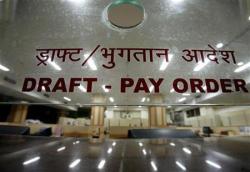Just a few days after tasting victory on the floor of the House over foreign direct investment (FDI) in retail, the government on Monday faced a familiar situation - an angry Opposition forcing adjournment of the Lok Sabha.
 The bone of contention this time was the Banking Laws (Amendment) Bill, introduced by Finance Minister P Chidambaram on Monday. The Bill has a few new clauses, including one on allowing banks to enter into futures trading.
The bone of contention this time was the Banking Laws (Amendment) Bill, introduced by Finance Minister P Chidambaram on Monday. The Bill has a few new clauses, including one on allowing banks to enter into futures trading.
The Opposition objected to the inclusion of provisions that were not part of the original amendments studied by the standing committee on finance.
BJP leader Yashwant Sinha, who heads the standing committee, said it was, in effect, a new Bill, since three key provisions were incorporated in the proposed legislation after the panel had given its report last year.
He insisted the provision on futures trading would allow banks to put money in speculative trading.
The Left parties and the Trinamool Congress, demanding the Bill be sent back to the standing committee, trooped into the Well of the House.
The finance minister got up to respond but the uproar continued and the House had to be adjourned, first for 30 minutes and later for the day.
Chidambaram later told reporters only one new clause had been added. "It does not make sense to send the Bill back for the parliamentary panel's
consideration," he added.
Sources said the other two new clauses were related to the term of the board of directors and bringing bank mergers under the purview of the Competition Commission of India instead of the Reserve Bank of India (RBI).
The Forward Contracts (Regulation) Act, 1952, allows all entities to participate in commodity futures trading. Banks can trade in shares, bonds and currencies, but Section 8 of the Banking Regulation Act prohibits them from trading in goods.
The finance ministry now wants to allow banks to trade in commodity futures, though RBI is not comfortable with this in the absence of a clear risk-mitigation mechanism and regulatory responsibility.
Ashvin Parekh, partner (financial services) at consulting outfit Ernst & Young, said RBI wanted banks to be away from anything that was speculative in nature, including commodities futures trading.
The original Bill had also sought to keep mergers and acquisitions in the banking sector under RBI, thus exempting it from the Competition Commission of India (CCI)'s check. In the new clause, only some mergers are proposed to be kept out of CCI's purview.
Sinha later told Business Standard he was not speaking on the merits of the new clauses but of the procedure, which did not allow the government to make changes to the legislation without referring it back to the standing committee. He cited the precedence set in the case of the Companies Bill.

 The bone of contention this time was the Banking Laws (Amendment) Bill, introduced by Finance Minister P Chidambaram on Monday. The Bill has a few new clauses, including one on allowing banks to enter into futures trading.
The bone of contention this time was the Banking Laws (Amendment) Bill, introduced by Finance Minister P Chidambaram on Monday. The Bill has a few new clauses, including one on allowing banks to enter into futures trading.